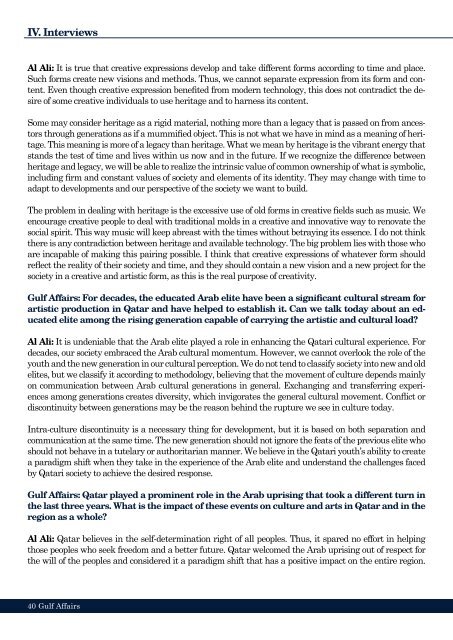You also want an ePaper? Increase the reach of your titles
YUMPU automatically turns print PDFs into web optimized ePapers that Google loves.
IV. Interviews<br />
Al Ali: It is true that creative expressions develop and take different forms according to time and place.<br />
Such forms create new visions and methods. Thus, we cannot separate expression from its form and content.<br />
Even though creative expression benefited from modern technology, this does not contradict the desire<br />
of some creative individuals to use heritage and to harness its content.<br />
Some may consider heritage as a rigid material, nothing more than a legacy that is passed on from ancestors<br />
through generations as if a mummified object. This is not what we have in mind as a meaning of heritage.<br />
This meaning is more of a legacy than heritage. What we mean by heritage is the vibrant energy that<br />
stands the test of time and lives within us now and in the future. If we recognize the difference between<br />
heritage and legacy, we will be able to realize the intrinsic value of common ownership of what is symbolic,<br />
including firm and constant values of society and elements of its identity. They may change with time to<br />
adapt to developments and our perspective of the society we want to build.<br />
The problem in dealing with heritage is the excessive use of old forms in creative fields such as music. We<br />
encourage creative people to deal with traditional molds in a creative and innovative way to renovate the<br />
social spirit. This way music will keep abreast with the times without betraying its essence. I do not think<br />
there is any contradiction between heritage and available technology. The big problem lies with those who<br />
are incapable of making this pairing possible. I think that creative expressions of whatever form should<br />
reflect the reality of their society and time, and they should contain a new vision and a new project for the<br />
society in a creative and artistic form, as this is the real purpose of creativity.<br />
Gulf Affairs: For decades, the educated Arab elite have been a significant cultural stream for<br />
artistic production in Qatar and have helped to establish it. Can we talk today about an educated<br />
elite among the rising generation capable of carrying the artistic and cultural load?<br />
Al Ali: It is undeniable that the Arab elite played a role in enhancing the Qatari cultural experience. For<br />
decades, our society embraced the Arab cultural momentum. However, we cannot overlook the role of the<br />
youth and the new generation in our cultural perception. We do not tend to classify society into new and old<br />
elites, but we classify it according to methodology, believing that the movement of culture depends mainly<br />
on communication between Arab cultural generations in general. Exchanging and transferring experiences<br />
among generations creates diversity, which invigorates the general cultural movement. Conflict or<br />
discontinuity between generations may be the reason behind the rupture we see in culture today.<br />
Intra-culture discontinuity is a necessary thing for development, but it is based on both separation and<br />
communication at the same time. The new generation should not ignore the feats of the previous elite who<br />
should not behave in a tutelary or authoritarian manner. We believe in the Qatari youth’s ability to create<br />
a paradigm shift when they take in the experience of the Arab elite and understand the challenges faced<br />
by Qatari society to achieve the desired response.<br />
Gulf Affairs: Qatar played a prominent role in the Arab uprising that took a different turn in<br />
the last three years. What is the impact of these events on culture and arts in Qatar and in the<br />
region as a whole?<br />
Al Ali: Qatar believes in the self-determination right of all peoples. Thus, it spared no effort in helping<br />
those peoples who seek freedom and a better future. Qatar welcomed the Arab uprising out of respect for<br />
the will of the peoples and considered it a paradigm shift that has a positive impact on the entire region.<br />
40 Gulf Affairs


